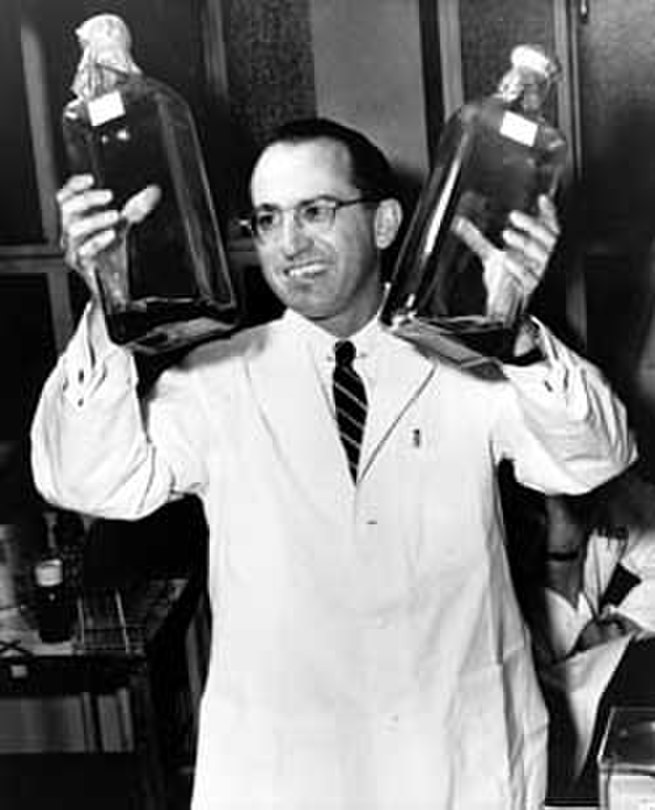
Main Difference
The main difference between Vaccine and Inoculation is that the Vaccine is a biological preparation that improves immunity to a particular disease and Inoculation is a method of purposefully infecting a person with smallpox (Variola).
-
Vaccine
A vaccine is a biological preparation that provides active acquired immunity to a particular disease. A vaccine typically contains an agent that resembles a disease-causing microorganism and is often made from weakened or killed forms of the microbe, its toxins, or one of its surface proteins. The agent stimulates the body’s immune system to recognize the agent as a threat, destroy it, and to further recognize and destroy any of the microorganisms associated with that agent that it may encounter in the future. Vaccines can be prophylactic (example: to prevent or ameliorate the effects of a future infection by a natural or “wild” pathogen), or therapeutic (e.g., vaccines against cancer are being investigated).
The administration of vaccines is called vaccination. Vaccination is the most effective method of preventing infectious diseases; widespread immunity due to vaccination is largely responsible for the worldwide eradication of smallpox and the restriction of diseases such as polio, measles, and tetanus from much of the world. The effectiveness of vaccination has been widely studied and verified; for example, the influenza vaccine, the HPV vaccine, and the chicken pox vaccine. The World Health Organization (WHO) reports that licensed vaccines are currently available for twenty-five different preventable infections.
The terms vaccine and vaccination are derived from Variolae vaccinae (smallpox of the cow), the term devised by Edward Jenner to denote cowpox. He used it in 1798 in the long title of his Inquiry into the Variolae vaccinae known as the Cow Pox, in which he described the protective effect of cowpox against smallpox. In 1881, to honor Jenner, Louis Pasteur proposed that the terms should be extended to cover the new protective inoculations then being developed.
-
Inoculation
The terms inoculation, vaccination and immunization are often used synonymously to refer to artificial induction of immunity against various infectious diseases. This is supported by some dictionaries. However, there are some important historical and current differences. In English medicine, inoculation referred only to the practice of variolation until the very early 1800s. When Edward Jenner introduced smallpox vaccine in 1798, this was initially called cowpox inoculation or vaccine inoculation. Soon, to avoid confusion, smallpox inoculation continued to be referred to as variolation (from variola = smallpox) and cowpox inoculation was referred to as vaccination (from Jenner’s use of variolae vaccinae = smallpox of the cow). Then, in 1891 Louis Pasteur proposed that the terms vaccine and vaccination should be extended to include the new protective procedures being developed. Immunization refers to the use of all vaccines but also extends to the use of antitoxin, which contains preformed antibody to e.g. diphtheria or tetanus exotoxins. Inoculation is now more or less synonymous in nontechnical usage with injection etc., and the question e.g. “Have you had your flu injection/vaccination/inoculation/immunization?” should not cause confusion. The focus is on what is being given and why, not the literal meaning of the technique used.
Inoculation also has a specific meaning for procedures done in vitro. These include the transfer of microorganisms into and from laboratory apparatus such as test tubes and petri dishes in research and diagnostic laboratories, and also in commercial applications such as brewing, baking, oenology (wine making) and the production of antibiotics.
In almost all cases the material inoculated is called the inoculum, or less commonly the inoculant, although the term culture is also used for work done in vitro.
-
Vaccine (noun)
A substance given to stimulate the body’s production of antibodies and provide immunity against a disease without causing the disease itself in the treatment, prepared from the agent that causes the disease, or a synthetic substitute.
-
Inoculation (noun)
The introduction of an antigenic substance or vaccine into the body to produce immunity to a specific disease.
-
Inoculation (noun)
The introduction of a microorganism into a culture medium.
-
Inoculation (noun)
An inoculum, what is inoculated
